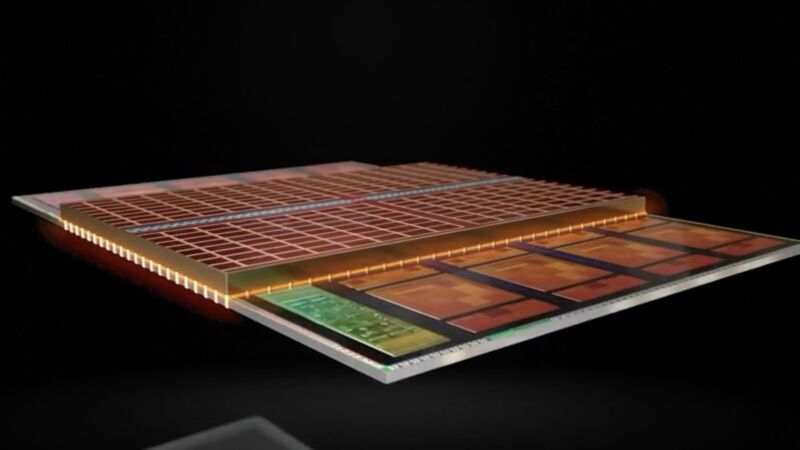
Enlarge / The 5800X3D is Zen 3 with extra cache. (credit: AMD)
AMD will release its latest experiment in CPU packaging to the general public next month. The Ryzen 7 5800X3D, announced at the Consumer Electronics Show in January, is an eight-core Zen 3 processor that uses unique memory-stacking technology to triple the amount of L3 cache in the standard Ryzen 7 5800X—96MB of L3 cache instead of 32MB.
The result is a chip that ought to run games 15 percent faster than a Ryzen 9 5900X, according to AMD’s figures. The company also says the chip will run games faster than Intel’s flagship Core i9-12900K, though it didn’t say by how much. The processor goes on sale for $449 starting on April 20th.
The 5800X3D and the half-dozen low-end Zen 2 and Zen 3 processors AMD announced today are likely the last hurrah for Socket AM4, the physical socket that AMD has been using since just before the introduction of the first Ryzen chips back in 2017. The years since have seen AMD regain its competitive footing against Intel thanks to several strong iterations on the original Zen architecture and use of TSMC's 7 nm manufacturing process.
Read 1 remaining paragraphs | Comments

Enlarge / The 5800X3D is Zen 3 with extra cache. (credit: AMD)
AMD will release its latest experiment in CPU packaging to the general public next month. The Ryzen 7 5800X3D, announced at the Consumer Electronics Show in January, is an eight-core Zen 3 processor that uses unique memory-stacking technology to triple the amount of L3 cache in the standard Ryzen 7 5800X—96MB of L3 cache instead of 32MB.
The result is a chip that ought to run games 15 percent faster than a Ryzen 9 5900X, according to AMD’s figures. The company also says the chip will run games faster than Intel’s flagship Core i9-12900K, though it didn’t say by how much. The processor goes on sale for $449 starting on April 20th.
The 5800X3D and the half-dozen low-end Zen 2 and Zen 3 processors AMD announced today are likely the last hurrah for Socket AM4, the physical socket that AMD has been using since just before the introduction of the first Ryzen chips back in 2017. The years since have seen AMD regain its competitive footing against Intel thanks to several strong iterations on the original Zen architecture and use of TSMC's 7 nm manufacturing process.
Read 1 remaining paragraphs | Comments
March 15, 2022 at 07:12PM

Post a Comment